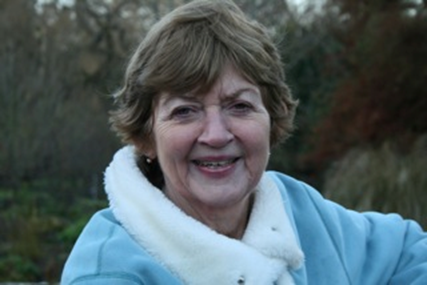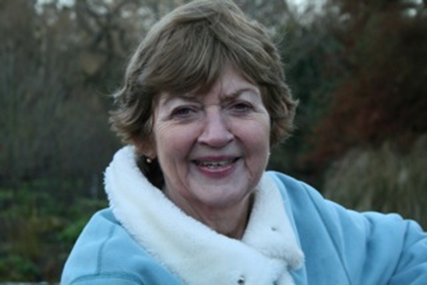
Welcome to my website, Jean!
Your international career, before becoming a prolific author, was as an English and Drama teacher. Can you tell us something about this fascinating part of your life and how you came to be working in the Far East?
I went to teach in Hong Kong because of two love affairs – one that had ended and one that was beginning. The one that ended was painful and I wanted a fresh start; the one that was beginning led me to Hong Kong, but, alas, the person concerned was posted to America and that was the end of that. However, I loved the new school, made many friends, and met my husband so Hong Kong has a special place in my life, though I have not been back for many years and will probably never return.
Do you think that your previous involvement in drama has enabled you to deepen the characterisation and events within your novels?
I think reading made me a writer, and teaching English and Drama, too. Everything you have ever read feeds your imagination and contributes to your experience and understanding.
In 2012 retirement coincided with the 200th anniversary of Charles Dickens’ birth. This sparked the idea of creating a detective series featuring Charles Dickens. How daunting was this once you had made the decision to commit to writing the series?
I didn’t think about a series. I just had the idea for a detective story – I’d always wanted to write one and when I read about Dickens’s founding of The Home for Fallen Women, the idea came to me about a murder there. The first book sparked the second. At this stage I was thrilled to find that I could do it and it wasn’t until I embarked on a third that I realised what a hazardous undertaking it was – to have the nerve – cheek, even, to use Charles Dickens as a detective, but it was too late, the first one was published. No one seemed to object so I have carried on to write eight so far – number six has just been published by the wonderful Sapere books.
You obviously had an in depth knowledge of the author’s work, but how much further did you need to delve into his life and writings to really feel you understood the man?
I read as many of the biographies as I could – I knew the facts must be right. The most important resource to stimulate my imagination is the letters – 14,000 of them in the Pilgrim edition, and these give me Dickens’s voice as well as facts about his life, opinions he held, and his attitudes to the issues of his day and to the people he knew. The speeches are very useful, too, as is Household Words for which there is an on-line edition. If I get stuck, lack inspiration, or generally feel I can’t get on with a book, I read his, and very often a quotation or incident sets me off again.
What was the most surprising aspect of his amazing life that you discovered?
His boundless energy – it is astonishing how much he did, not only as an author, but as a journalist, editing Household Words and writing numerous articles for it, making speeches, presiding over philanthropic enterprises, directing and acting, writing all those letters, walking as many as 17 miles a day, dining out, and having a wife and family of nine children. There were actually ten, but Dora died as a baby.
Were you surprised when you realised that Charles Dickens had generously supported The Home for Fallen Women? Do you think he was ahead of his time in understanding some of the social issues impoverishing women?
I was surprised to read about The Home for Fallen Women. It was an extraordinary thing for an author to do. What concerned him was the grim cycle of criminality – created by poverty – imprisonment followed by further crime because there was very little provision for women who went into prison. There has been some comment on his arranging for the young women to emigrate, but Dickens knew that they had to escape their past lives and start again.
Have you had a strong response to your series from Dickens’ fans?
Yes I have. The most touching comment was ‘Charles Dickens would be proud of you.’ I’m not sure about that, but people do say that they have gone on to read Dickens again or for the first time because they’ve liked what they’ve read in my books and that is really pleasing – for a former English teacher.
Charles Dickens travelled widely giving readings. Do you intend to include various settings as the series continues, although mainly set in London?
I love the London setting – all gaslight, fog and dark alleys, made for murder. I did venture to Manchester in the third book. As luck would have it for Dickens, Superintendent Jones happened to be visiting Manchester at the same time. They went to Paris in the second book and Dickens was in Venice at the beginning of number five. The question set me thinking, though, about a country setting – a Chesney Wold sort of setting appeals, a large and gloomy house with wastes of empty rooms.
He was interested in ghosts, supernatural entities, mesmerism and séances as were many in the Victorian era. Would you ever attend such an event to try to make contact with the soul of the man himself? If so, is there a question you would love to pose to him?
He was very sceptical about séances or table-rapping as it was called. I don’t think I’d dare to try to make contact. Suppose he hated the idea of becoming a character in a book!
It is well documented that his marriage and his parenting skills were perhaps lacking by today’s expectations, but he had many dimensions and seems to have been gifted in other areas of his life. How much do you think his experience of Marshalsea debtors’ prison in his younger life affected his outlook upon the shortcomings of society and fuelled his drive to try and help educate people about these issues?
The number of prisons which appear in his works testify to the deep and enduring impression made by his father’s imprisonment in the Marshalsea. It was a scar on his heart and I do think it heightened his sympathy for the poor, especially children who were born into the most abject poverty and received no education. He supported the Ragged School Movement, the Foundling Hospital and various other charities for orphaned and abandoned children. He sponsored a shoe-black boy who was a Ragged School pupil, and there are many, many instances of private charitable acts. It was as if he felt that he would have been one of them had the family’s fortunes not improved.
Has your investigative Charles Dickens been compared to the fictional Sherlock Holmes? If so do you see them as very different characters or similar and in what ways?
I haven’t seen any comment about Sherlock Holmes. I think Dickens’s approach to the investigations is more intuitive and emotional than Holmes’s, though Dickens was said to be incredibly observant. His eyes missed nothing and he had a very exact memory for detail – useful traits for a detective. Holmes seems more ‘scientific’ to me and rather bloodless at times.
How careful/respectful are you of what he does within the fiction so that the reader who is not aware of the real man’s life is given a distorted reflection of the man he actually was?
I do try to be very careful about my portrayal of Dickens. As I said before, the facts must be right, but it is in the gaps where the historical novelist can invent something that might have happened in that space. A good example is my Manchester story. Dickens did go to Manchester with his amateur theatrical group and they performed a play by Bulwer-Lytton. I invented another occasion and included a different play by Bulwer-Lytton – a play that Dickens admired. I invented the murder, of course, and I chose a different theatre in Manchester, one which had been demolished, but I was astonished to find that there had been an accidental shooting in that very theatre and the property manager had been tried for manslaughter.
As to my version of Dickens, there have been comments that it is rather too fond a picture, but I have based it on my reading of him, and I do think his relationship with Superintendent Jones would be rather different from other relationships, and I do try to hint at his faults and his growing dissatisfaction in his marriage. Claire Tomalin says ‘everyone finds their own version of Charles Dickens’ and Charles Dickens, the detective is mine. I wanted to be true to the character of Dickens as I discovered him in his own works, his letters, his speeches, and the biographies. There is a very amusing – and rather prescient – quotation from Miss Prism in The Importance of Being Earnest: ‘I am not in favour of this modern mania for turning bad people into good people at a moment’s notice…’ I’m saying the opposite – I am not in favour of turning good people into bad people, so I am careful. There is a danger that when a writer presents a famous figure in a very unflattering light, or even invents incidents in which the person, say, turns to crime or deviancy that is then believed by the general reader who may not have an academic knowledge. In the end, though, the detective story sets out to entertain so I really don’t think it is my place to invent a Dickens who is wicked, or criminal, or deviant.
The books are intriguing detective novels in their own right, but are also layered so that Dickensian references and threads are woven throughout. Do you consciously add these in or does it happen organically as you have absorbed so much research about the man, his life, his letters, novels and the reports about events he held?
I think the references to his life and works do come naturally now as I have read so much, though I still have to check the facts and dates.
Would your ideal dream to be to see your series televised? If so, who do you think would do the part justice?
It would be amazing to see the stories televised – what a dream! I saw Ralph Fiennes as Dickens in The Invisible Woman – he’ll do very nicely, thank you.
Who has inspired you the most in your work and your life?
My husband whom I miss every single day.
How have you stayed fit in mind and body throughout lockdown and these challenging times.
Gardening and walking about the country lanes to keep fit in body, and writing a new book, finding a new story for Dickens and Jones.
What is next for J C Briggs?
I have just signed a new contract with Sapere for two more Dickens books which are finished. I’ve started another, and I am contemplating a new series with a female protagonist. I’ve started writing fragments, but there’s no discernible plot yet, which is something of a problem. I hope one will emerge.
Thank you for your time and patience answering my questions in such an inspiring way and every continued success with your fascinating books.











